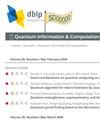Randomness in nonlocal games between mistrustful players
IF 0.8
4区 物理与天体物理
Q3 COMPUTER SCIENCE, THEORY & METHODS
引用次数: 2
Abstract
If two quantum players at a nonlocal game G achieve a superclassical score, then their measurement outcomes must be at least partially random from the perspective of any third player. This is the basis for device-independent quantum cryptography. In this paper we address a related question: does a superclassical score at G guarantee that one player has created randomness from the perspective of the other player? We show that for complete-support games, the answer is yes: even if the second player is given the first player's input at the conclusion of the game, he cannot perfectly recover her output. Thus some amount of local randomness (i.e., randomness possessed by only one player) is always obtained when randomness is certified from nonlocal games with quantum strategies. This is in contrast to non-signaling game strategies, which may produce global randomness without any local randomness. We discuss potential implications for cryptographic protocols between mistrustful parties.互不信任玩家之间非局部游戏中的随机性
如果非局部游戏G中的两个量子玩家获得了超经典分数,那么从任何第三个玩家的角度来看,他们的测量结果必须至少是部分随机的。这是独立于设备的量子密码学的基础。在本文中,我们解决了一个相关的问题:G的超经典分数是否保证了一个玩家从另一个玩家的角度创造了随机性?我们证明,对于完全支持游戏,答案是肯定的:即使第二个玩家在游戏结束时得到了第一个玩家的输入,他也无法完全恢复她的输出。因此,当用量子策略从非局部游戏中证明随机性时,总是会获得一定量的局部随机性(即只有一个玩家拥有的随机性)。这与非信号游戏策略形成了对比,后者可能产生全局随机性,而没有任何局部随机性。我们讨论了对不信任方之间的加密协议的潜在影响。
本文章由计算机程序翻译,如有差异,请以英文原文为准。
求助全文
约1分钟内获得全文
求助全文
来源期刊

Quantum Information & Computation
物理-计算机:理论方法
CiteScore
1.70
自引率
0.00%
发文量
42
审稿时长
3.3 months
期刊介绍:
Quantum Information & Computation provides a forum for distribution of information in all areas of quantum information processing. Original articles, survey articles, reviews, tutorials, perspectives, and correspondences are all welcome. Computer science, physics and mathematics are covered. Both theory and experiments are included. Illustrative subjects include quantum algorithms, quantum information theory, quantum complexity theory, quantum cryptology, quantum communication and measurements, proposals and experiments on the implementation of quantum computation, communications, and entanglement in all areas of science including ion traps, cavity QED, photons, nuclear magnetic resonance, and solid-state proposals.
 求助内容:
求助内容: 应助结果提醒方式:
应助结果提醒方式:


